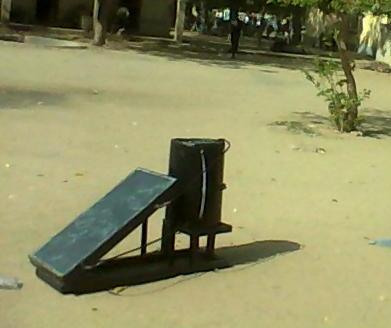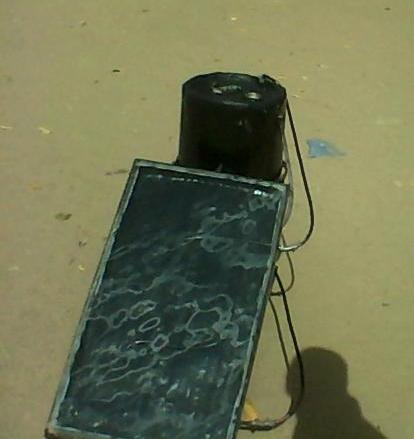A
UNIMAID final year student , Muhammad jaafar from the department of
physics has constructed a solar water heater, a water heater utilizing
the sunlight to produce a hot water for domestic hot water demand. the
solar water constructed from a locally available materials to minimize
cost , made for simplicity of installation, reduce electricity bill and
durability to meet domestic hot water demand.
According to him ,
the solar water heater can heat water up to 70°C which sufficient for
domestic water demand ; in his word “A solar water heating system for
domestic use has been designed and constructed using locally available
materials. Solar energy is received by a flat-plate collector consisting
of a thin absorber plate, integrated with grids of fluid carrying
tubes, and placed in an insulated casing with a transparent glass cover
having a water tank integrated in the system. The radiation emitted by
the absorber plate cannot escape through the glass, thus increasing its
temperature. On the principle of thermosyphon, hot water is pushed
through the collector and rises by natural convection to the water
storage tank and cold water from the water tank simultaneously descends
to the bottom header of the collector by gravity pull.
The water
gets heated and flows into a storage tank through thermosyphon
principle. The system was tested and Maximum fluid output temperature
and the collector temperature, of 75°C and 70°C respectively, were
obtained on a sunny day. This solar water heating system finds useful
application and acts as a renewable energy resource in regions where
there is abundant and consistent sunlight.”
He further explained
the working principle of the solar water heater , in his words ”
Principle of operation of a flat-plate solar water heater, The solar
radiation passes through the glass in front of the absorber plate and
strikes the flat black surface of the absorber plate where the solar
energy is absorbed as heat (i.e. by increasing the internal energy).
Figure 2 solar water heater showing the flat plate solar collector exposed to sunlight
This
causes the flat-plate collector to become very hot, and so the water
contained in the pipes bounded to the plate also absorb the heat by
conduction. The water inside the tubes (risers/headers) expands and so
becomes less dense than the cold water from the storage cylinder. On the
principle of thermosyphon, hot water is pushed through the collector
and rises by natural convection to the water storage tank and cold water
from the water tank simultaneously descends to the bottom header of the
collector by gravity pull.
Therefore, there is circulation as a
result of an increase in temperature and volume of the warmer water to
the water storage tank. The circulation continues as hot water goes out,
while cold water comes in.”
When asked what are advantages of
this solar water heater , he said Solar water heaters based on
thermosyphon principle have the following advantages: simplicity and low
cost, requires no electrical supply, need no controller or pump, easy
to install, can withstand mild sub-zero temperature, is reliable and
long-lasting since there are no moving parts, scalable (several
collectors can be connected in parallel to increase hot water supply),
is easy to build and operate, no fuel cost, provides heated water of
about 70 °C or within the range, and is portable.
They,
however, have the following disadvantages: cannot withstand mains
pressure, cannot give higher temperature water, are affected by weather
conditions, very useful only during the dry season, and can be more
practicable and useful in the sunny regions.”
when asked what is
the significance of this project he said “ it designed to address
challenges and threat pose by the use of fossil fuels ; such as the
increase in oil demand accompanied with oil price rise, political crises
in the world oil deports, depletion of oil reserve, reduced
availability of fossil fuel, and other harmful effect attributed to the
use of hydrocarbons such as, oil spillage, aquatic water pollution,
agricultural soil degradation, ozone layer depletion, health hazards,
and relatively tangible problems of aesthetics to problems of
environmental conservation, greenhouse effect, and global climate change
and other air pollution issues caused mainly by burning of these
hydrocarbon as a source of heat energy .
The unavailability of
electricity in most of our rural area, its high cost and inadequacy has
led to the drive to use environmentally friendly, cheap and renewable
alternative sources of heat energy to eliminate or minimize these
negative effects. Presently, solar and other alternative energy
resources are being harnessed for various applications such as power
generation, air-conditioning, space heating, domestic hot water system,
etc. “

 |
0 Response to "UNIMAID Final Year Student Constructed Solar Water Heater "
Post a Comment